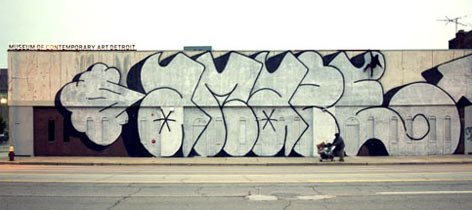For the past four years I've been putting together bits of archival footage (especially amateur and home movies) that show vanished places, people and events in San Francisco. The past two compilations, sponsored by Long Now Foundation, are free to view here.
Now I've been given the chance to do the show I've always wanted to do: Lost Landscapes of Detroit. It's happening February 10 at Museum of Contemporary Art in Detroit.
This isn't going to be a narrative of urban decline or the "ruins porn" that's become fashionable. Rather, it's a collection of amazing and almost-all-lost footage that celebrates a vibrant, busy and productive Detroit from 1917 through the 1970s. The idea is to bring these images back to Detroiters for their contemplation and use as they rebuild their city for the future.
In that spirit, at the screening I'm going to give out copies of the show so people in Detroit can reshow and remix it, and it'll be online at the Internet Archive after the screening.
This film was fascinating and really wonderful to watch, to experience. I got there just in time, running a bit late as always. They cut off the crowd just one person behind me, it was way more packed than expected, I guess. The museum is a relatively small space, it's kind of like a large gallery.

Pleased to not be missing any of the film yet, I gradually managed to work my way up to the front of the space filled with a large seated audience, a large standing audience, and a smaller crowd seated on black mats at the base of the wall where the film was being projected. Score for me, I got to sit right in front, otherwise shorty me would have been a bit frustrated trying to stand!
Rick Prelinger presented the film with a brief talk introducing himself, his archives, and the film. The Prelinger Archives is in San Francisco. They have a huge library filled with thousands of different materials. Photocopying, scanning, sharing is encouraged with all of their materials, including the films, which are available online at the Internet Archive! Something he mentioned in his talk that stuck with me is the idea that this collection of ephemeral films is neither ruin's porn nor sentimental nostalgia, rather it is a "complex visual history." Prelinger spoke this phrase and it brought to mind precisely what I want to do with my documentation and analysis of Detroit techno and house music. A complex sonic history, or a complex auditory history. But also, I intend to acknowledge complexity in terms of identity, culture, experience, musical production, musical performance, etc. There's certainly not one single picture or perspective of Detroit or of electronic music of Detroit. And central to my entire research project here is emphasizing the importance of that concept of complexity, and diversity, in Detroit techno.
Two disclaimers that he mentioned in his introduction to the film are that there is not enough footage of African Americans nor of working Detroit. He's still searching for footage of Detroit, still collecting. I suppose one reason for the lack of African American's and working class people on film from home movies, industrial films, etc. is money. People with free time and excess money would have been much more likely to own video cameras.
All the footage was so interesting. There was some footage of an African American church procession in Detroit, I missed what denomination it was. Rick Prelinger mentioned it while the film was playing. Some film of Vietnam war protests - large groups of people, Black and white, walking down Woodward Avenue. A Detroit News reporter was interviewing protesters and people watching the protest. An older white man complained to the reporter about the protesters using foul language. The reporter asked him if he thought people shouldn't be allowed to protest. He replied that of course people should be allowed to protest, as long as they know what they are protesting. There was really interesting footage from 1944 of housing developments going up in Detroit - barren land, no grass yet even, just houses, sidewalks and people. This is one year before the end of World War II when the GI bill gave soldiers coming back from the war the opportunity to buy new homes, find new jobs, and start families.
The audience was super vocal and knowledgeable as well. The idea was for the crowd to provide a spoken spontaneous soundtrack for the film, and they did! It was so great because I certainly didn't recognize most of the places in the films, but once I heard someone else shout out what the location was, or what the building was, or might have been, or when it was torn down, or what it is now, I felt like I could really recognize more than I thought I would. It was a wonderful experience seeing this collection of films in Detroit with an active, local audience. There are plans for future films featuring Detroit from the Prelinger Archives. I'll be waiting.







No comments:
Post a Comment
Note: Only a member of this blog may post a comment.